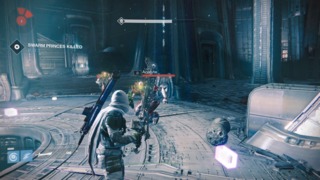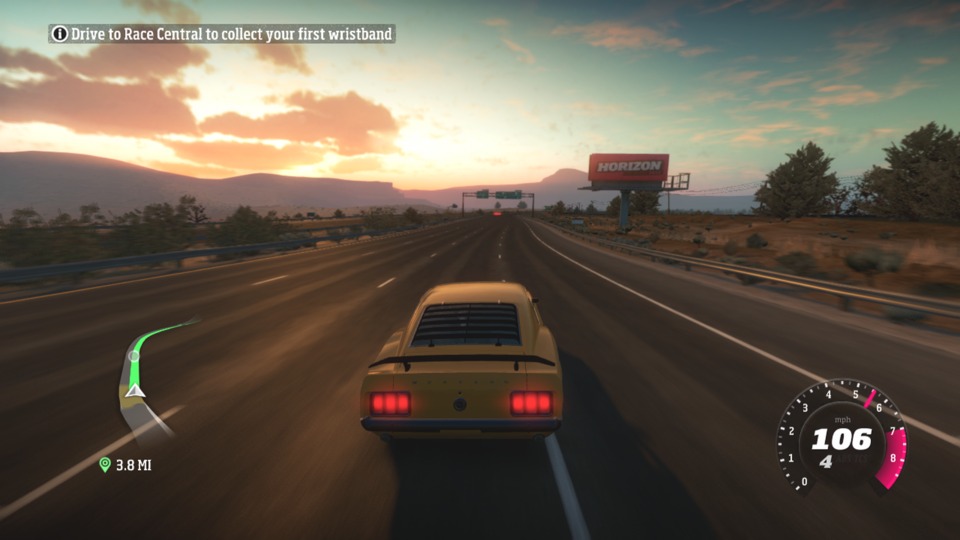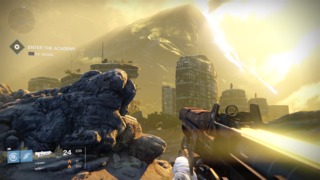On Grind & Context
By Darth_Navster 7 Comments
Happy October dear readers! The air has become crisp, the days have become shorter, and a torrent of worthwhile games seeks to engulf us all. Unfortunately for me, this time of year coincides with baseball’s postseason and with it a Sophie’s choice on where to spend my limited funds. So far baseball has won out, and I’ve spent a significant chunk of my disposable income to go see a very memorable Wild Card game in person. Given my current monetary situation, I’ve gone through my backlog and found myself spending time with two games that in many ways are surprisingly alike; Forza Horizon and Destiny. On the surface it seems absurd to compare an open world driving game to a loot driven first person shooter, but for all their aesthetic and mechanical differences they remain steadfastly wrapped around the same core loop: grind. Whether it be better cars, guns, rank, or level, both games’ progression are inherently tied to advancing the player character’s effectiveness and standing in the world. However, the methods that each game uses to present grind differ, and within those differences we can see how grind can either elevate a game or weigh it down.
Progression, but to what end?
Forza Horizon’s central conceit is the Horizon festival, a sort of hipster gathering not unlike Burning Man that is dedicated to racers of all stripes speeding through the gorgeous Colorado landscape in order to get famous. Ignoring the expense and environmental impact of such an event, the concept is pretty easy to grasp. Let’s compare that to Destiny, in which I’ll quote the Giant Bomb wiki entry:
Set over 700 years into the future (after a period of technological advancement known as the Golden Age, thanks to a mysterious orb known as "The Traveler"), a mysterious event (known as "the Collapse") has decimated human colonies throughout the galaxy. With the last surviving human city on Earth defended by The Guardians (warriors who have unique abilities granted by The Traveler), players take control of a customizable Guardian, who must investigate the solar system and destroy a variety of alien threats before humanity is wiped out.

In that paragraph alone, I count two uses of the word “mysterious”, four parenthesized statements, and four separate pronouns that would be unfamiliar to a newbie. Granted, Destiny is a bit more high concept than Forza Horizon, so it’s not damning that it starts off as enigmatically as it does. But the game then needs to fill in the gaps as it proceeds. Ten hours into Destiny, those gaps have yet to be filled. I go on missions and have no idea why I’m fighting the various enemy factions, why I keep deploying my Ghost to hack things, or why certain missions allow me to go solo while others require I wait to be matched up with online players before deploying. The end goal to all this is similarly obscured. I am a Guardian and I’m to protect humanity from alien threats. But is that it? Am I simply to forever run patrols on uninhabited planets and recover artifacts so humanity survives? What is the end goal? The game seems reluctant to spell this out.
Contrast that with Forza Horizon, which if anything over-explains the hows and whys of everything you do. I complete events to increase my fan base and win money, which I can then use to enter more prestigious events and buy better cars. But that’s the treadmill, what’s the end goal? The game spells this out by presenting a ladder rank of 250 racers, of which you start at the bottom. From there, by racing well and doing risky maneuvers, you work your way up to be the number one racer at the Horizon festival. In addition to having this easily understood end goal, the game constantly reminds you of it. A meter pops up whenever you progress in some way that shows how close you’re getting to overtaking the next racer on the ladder, and in doing so ties in all of the Forza Horizon’s progression systems into one easily comprehensible number.
Good gameplay is not good enough

Forza Horizon and Destiny both come from highly regarded pedigrees. Bungie of course has practically written the book on console shooters with their work on the Halo series, and so it’s no surprise that the act of shooting a gun and moving around in first person feel satisfying. Playground Games, while lacking in previous experience as a developer, worked under the watchful eye of Turn 10 Studios, who have crafted one of the best driving franchises around in Forza Motorsport. Forza Horizon benefits from this by having a driving engine that allows each car to feel distinct yet responsive. If you were only to take a vertical slice of each game’s more exciting bits you’d be hard pressed to point out any flaws. But neither game exists as a vertical slice, and by considering the gameplay as a component of the complete experience we can see how important it is for basic mechanics to work in harmony with the rest of the game.
Given the expansiveness of both games and their relatively short core loops, there can be times when pacing sags. In Forza Horizon’s case, there can be some interminably long road trips to get to a racing event that just happens to be far enough away from a fast travel point to make driving there the better option. Add to that the fact that fast travelling costs money (be it in-game or *shudder*, actual cash), and the game actively disincentivizes players from simply proceeding to the next event where the real fun is located. Despite this, Forza Horizon makes things interesting by encouraging players to engage with open world events, collectibles, and stunts. It also gives you a steady stream of cars with a diversity of handling, horsepower, and aesthetics such that driving around is given new life each time you visit the garage. The game even encourages you to switch up your cars by using event restrictions such that you’re not just driving around in your “best” vehicle.

Destiny, on the other hand, offers no respite from its pacing issues. Missions all feel alike and have players trodding the same environments repeatedly. New weapons don’t feel significantly different from one another outside of basic variations in standard gun design (i.e. burst fire or full auto, fire or electrical damage, etc.), and there’s almost no reason to go back to an older gun once you find a “better” one. Furthermore, as you progress to higher level missions thanks to your higher level gear, the equipment feels like it’s performing as well as the equipment it replaced when you were facing lower level enemies.
One can make the argument that this sort of design is inherent in role-playing games, as you need to grind to keep up with more powerful enemies. However, that ignores the complexity that makes late game encounters interesting. For instance, let’s look at the Final Fantasy series. Whether it’s a lot or a little, each Final Fantasy game has some amount of grind necessary to move the game forward. But when you’re grinding up your party in those games, not only do basic stats like strength and defense increase, but you also unlock additional spells, summons, and abilities that give the players many possible options and strategies when in a tough combat encounter. While Destiny does have character progression, a lot of it is tied to making your avatar more efficient at the stuff he or she already does. It’s hard to get excited about leveling up when all it means is your grenades cool down slightly faster.
Narrative should acknowledge progression

Over the years I amassed countless cartridges, memory cards, and hard drives full of save files commemorating several thousand hours of game time. No one in the real world but me cares about the things I’ve accomplished in those save files, and really, if 95 percent of them were to burn away in a fire, I can’t say that I’d be too bummed (minus the cartridges, of course). But during those many hours, it’s vitally important that the game I’m playing creates an illusion that my progression matters; that my engaging and mastering the game will somehow affect the state of the virtual world. It’s here that Destiny and Forza Horizon go in opposite directions, and in doing so gets to the heart of why grind can be so contentious an element in games.
In Forza Horizon’s case, the narrative wholeheartedly reinforces your sense of progression. You get a hot new ride and you’re complimented for it, you move up in rank and someone chirps in your ear about how you’re making waves. Other racers will taunt you before a race and then will begrudgingly acknowledge your superiority when you inevitably best them. Fireworks shoot off as you approach the finish line, and fetishistic camera angles will ogle your car before and after an event. Can it be a little much at times? Sure, but for the most part the game simply makes you feel like a star, and it feels good.
Now, it’s understandable that Destiny isn’t as boisterous in acknowledging the player’s advancement due to its self-serious tone. Not everything needs to be as chipper as Forza Horizon. Still, there needs to be something that lets the player know that their actions are affecting the world around them. On this count Destiny fails miserably. No matter how powerful I get or how far down the upgrade tree I go, I never feel like anything more than an escort for my Ghost as it proceeds to whatever the next arbitrary objective will be. Enemies don’t seem to care that I’ve mowed down thousands of their friends and there’s no in-universe recognition of my contribution in keeping humanity safe. Rather, I feel like one of a million Guardians tasked with running pointless, repetitive errands. The result is boredom.
Final thoughts
Admittedly, I’m not very far in either Destiny or Forza Horizon, having only played about ten hours in each. In Destiny’s case I understand that the expansions fix a few glaring issues with the game, and I look forward to giving them a shot. Who knows, maybe Forza’s core loop will grow repetitive while Destiny’s late-game gets more interesting. But that’s beside the point I’m trying to make. Grind is a valuable tool in creating long, memorable gaming experiences, but without considering how to contextualize grind, it becomes busywork. Progression must feel substantial and meaningful for grind to be work, whereas grind for grind’s sake will sink even the most mechanically refined games. That remains true regardless of what planet you explore or road you drive.